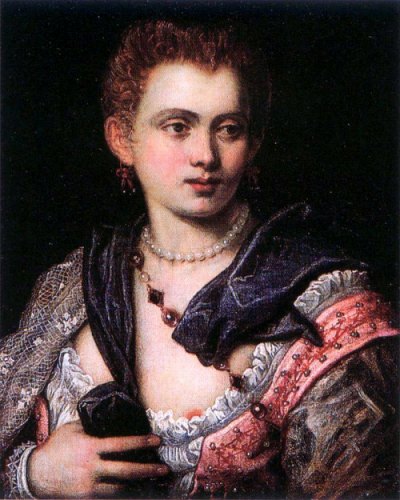33.
Filippo never
made it back to his room that night. Instead he slept with one of Venice's most famous courtesans. Though since the
plague she had fallen on hard times, she still had a soft luxurious feather-bed
and wore a red silk nightdress. Her modest house was filled with sons and
nephews and servants, but her bedroom was sacred taboo to them. They knew
Filippo was not a paying client, and he returned for several nights thereafter,
talking with her long into the night.
He told her
that he did indeed aspire to be a magus, but that did not mean pulling animals
out of hats, cloaks, or canals. It involved no sleight of hand or trick of eye,
but the creation of bonds, links, vincula. Strategies of manipulation,
whether of atoms or of minds, or even worlds. Back then, he had not worked out
all the details yet. But even now, after almost finishing his essay "On Magic," he knew it was no mere coincidence that he
should rescue her cat, for a bond had formed between him and Veronica at the
bookshop, and he had simply, quite unconsciously, followed the link and plucked
Circe from the dark waters of the rio.
The next
afternoon, he sat with Veronica in the parlor while she told her son Achiletto
all about the rescue. She sat with her son on a divan under a magnificent
portrait of her, painted by Tintoretto just before the plague had descended.
Across the parlor in a chair, Filippo studied the image. The broad forehead and
bright brown eyes evinced great intellect, yet the blushing cheeks and pursed
lips were vivid with sensuality. She wore hoop earrings tied with bows of red ribbon,
a sumptuous pearl necklace, and a crimson gown with tight silk bodice so
low-cut that the frills of her linen camicia failed to quite cover one of her
nipples. Indeed between her lovely breasts her right hand held the dark blue
scarf, draped loosely over her shoulders, away from her left breast,
deliberately exposing it.

"You were very fortunate, signora, to sit for
Tintoretto."
"Certo, Signor
Nolano, but he flattered me excessively, outdoing nature. I am not nearly that
handsome."
"Oh Mother," said Achiletto, "don't be so modest, it ill becomes you."
"Your tutor will be here any minute, dear. You'd best go prepare your lesson now."
After he left the room, she said, "Actually he's right. It really is a perfect likeness, it captures exactly how I was, before the plague. When I first saw it I wondered for awhile whether it was a painting or an apparition set before me by some trickery of the devil, not to make me fall in love with myself like Narcissus, but to make me miserable when my skin finally wrinkles and cracks long before the oil in the painting. When I grow older and poorer, an honored courtesan no longer."
